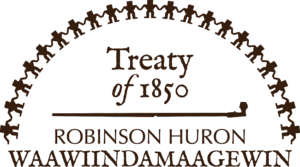Opinion: Ontario’s delay fuels anti-Anishinabek racism
Ontario is delaying the all-but-inevitable outcome of the Robinson Huron and Superior treaty trials by appealing findings for the Anishinabek in both stages one and two of the three-stage process.
To what end this waste of time, skill, and money? Delay pushes back payday, which must be appealing, and could saddle the next government with a giant bill, but there’s more going on. Looking at the trial with a wider lens, we see that this delay allows already existing non-Indigenous fear and resentment of a potentially very large cash ‘award’ to grow, while simultaneously undermining Anishinabek solidarity as legal costs to the community mount without any tangible benefits. Both of these dynamics harm the Anishinabek negotiating position because they pose a real threat of harm to community members.
The terrible part is that Ontario knows this is happening — we all know it’s happening. In a recent letter to the Manitoulin Expositor, one non-Indigenous Ontarian laid out the falsehood-laden narrative that we all learned in Ontario’s public schools and is echoed daily in many sectors of the Canadian media. The writer asserts that the treaty was a one-time deal with no revenue-sharing, that the Anishinabek claims are fabricated, and that the treaty is not legally binding. Worse still, he says a large award would backfire, causing widespread resentment toward the Anishinabek, even as he himself is stoking that resentment in a newspaper read by many non-Indigenous people on Robinson Huron land.
The implication that the Anishinabek, simply by demanding justice, would be responsible for an anti-Anishinabek backlash was echoed by one of the appeal judges. Asking the Anishinabek’s council, Catherine Boies – Parker, what her clients meant by the phrase “fair share,” the judge offered his opinion that a payment calculated relative to resource revenue would be a “multi-billion dollar exercise that would rupture the relationship between the Anishinabek and the rest of Ontario.”
The judge’s question detaches the case from reality itself. It has always been the Anishinabek’s contention that the monies owed were relative to resource revenues. The judge pressed the Anishinabek’s lawyer to simply pretend that the treaty means something other than what the Anishinabek have always believed and maintained it to mean.
Unfortunately, the people most able to diminish the growing threat of widespread anger, to telegraph to the public that not only are the Anishinabek’s demands reasonable and just, that the current crisis itself is not of their making, are the defendants, the Ontario government. But they are doing the opposite: stoking the fires of anger and resentment and conjuring a spectre of the Anishinabek as unreasonable in their demands and irresponsible in their approach.
In one of his earliest statements on the subject as Premier, Doug Ford supported the “treaties as one-time cash payment” fiction saying that all of the treaties had been fulfilled.
Throughout the trial, Crown council has mocked the idea that Robinson and the British meant for the annuity to increase so long as resource revenues increased.
The Crown presented a witness who said that Anishinaabe people in the past were uncivilized and dismissed their legal traditions.
Crown council diminished the legal import of Anishinabek statements by framing them as figurative and poetic: Ogimaa Peau de Chat’s clear statement that he understood the cash value of copper to the British, and insistence that any treaty with them must include a share of mineral revenues for the Anishinabek, was referred to as an “eloquent speech.”
Detaching the real-life events in the courtroom from actual events in the past in order to come to a pragmatic solution in the present suggests that the treaty itself is a malleable fiction. The Expositor letter writer played the “it’s all a game” card by repeatedly referring to possible court-ordered payment as the Anishinabek’s “court winnings.”
I was reminded of a conversation with one of the Crown’s witnesses, an expert on what is now southern Ontario, who had testified for the Crown that the land of northern Ontario that is encompassed by the Robinson Huron and Superior treaties was of little value in 1850 because it wasn’t good for farming. As a fellow historian who had read and liked his work, I asked him why he had done it? Why he had taken money to testify against the Anishinabek? He gestured at the area of the court where the Crown attorneys were seated, then at the Crown attorneys, and said, “It’s just a game. Everyone’s just playing a part.”
And that’s the answer to the question, How did it get this bad? How do normal, basically nice, non-Indigenous Ontarians knowingly allow their neighbours to live without clean water year after year? How do we justify not living up to our own promises? It’s because we don’t think Indigenous people are real, we don’t think their laws are real, we don’t think their treaties are real, and we don’t think their problems are real. It’s just a game.
But it’s not just a game. A slow but rising tide of anger in non-Indigenous Ontario is building toward the Anishinabek people who may finally receive their fair share. This anger and the threat that it poses to all Anishinabek, but most immediately to vulnerable Anishinabek in the cities and children in public schools, hangs over these court proceedings, forcing the plaintiff’s hand.
The Anishinabek know it.
Ontario knows it.
Everybody knows.



